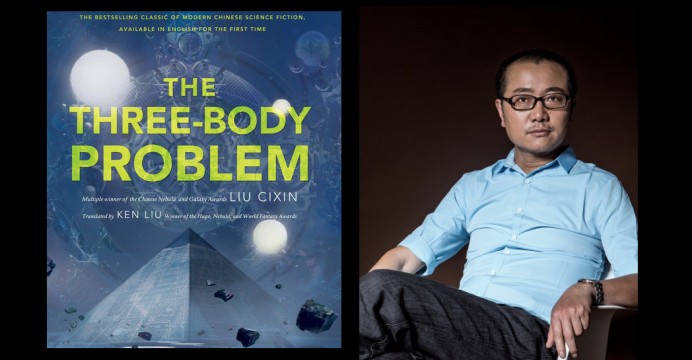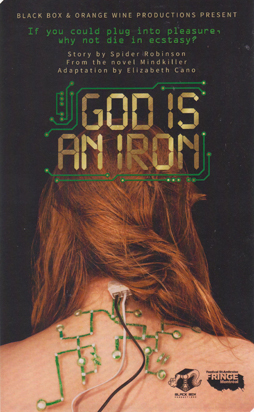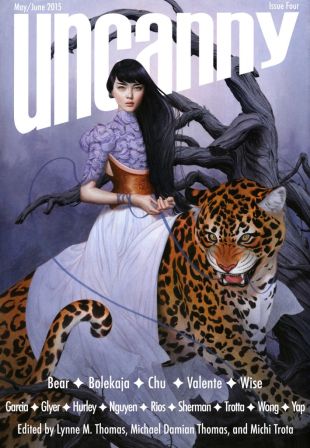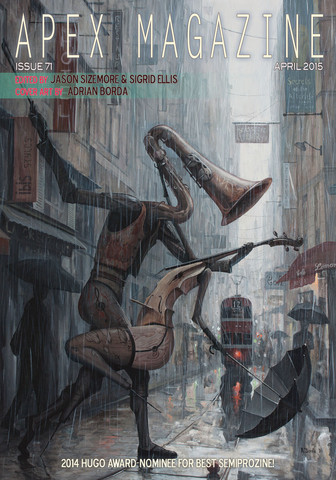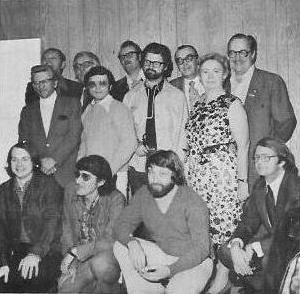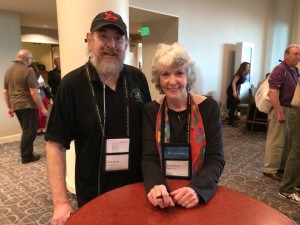aka The Puppy That Cried Love at the Heart of the World
Today’s roundup spans everything from legitimate beef to The Walking Dead, with visits along the way to James Worrad, Bob Mayer, Martin Wisse, Earl Newton, Brad Torgersen, T. L. Knighton and T.C. McCarthy. (Title credits go to File 770 consulting editors of the day Vivien and NelC.)

Todd VanDer Werff on Vox
“How conservatives took over sci-fi’s most prestigious award” – April 26
Do the Sad Puppies have a legitimate beef with the Hugos?
Not really.
In recent years, the Hugos have definitely taken a turn away from traditional pulp sci-fi toward more literary works. But science fiction has always had pulp and literary writers, and the latter crowd has traditionally been more successful at awards ceremonies — just as it has with the Pulitzers or National Book Awards, where Phillip Roth is more likely to win than Stephen King.
The Puppies’ claim here also ignores that the science-fiction community has traditionally backed all sorts of authors, of all sorts of political stripes.
“Robust conservative voices have always been part of the SF&F conversation.”
“What’s actually notable about the SF subculture is its heterodoxy, expressed by things like the Libertarian Futurist Society sometimes giving their Prometheus Award to the Scottish socialist SF writer Ken MacLeod, or MacLeod himself talking about the importance to him of right/libertarian writers like Robert Heinlein and Poul Anderson. Robust conservative voices have always been part of the SF&F conversation,” [Patrick] Nielsen Hayden told me.
The Puppies also insist there’s an unstated secret cabal running things behind the scenes of the Hugos, and that the only way to fight it is to push back against it.
Said Torgersen again: “Sad Puppies was necessary because everywhere I went in the field (as a young professional) I heard the same gripes: that the same predictable names always popped up in the same categories, that other names were always left out in the cold, or in the Hugo awards blind spots, and that the way to win a Hugo was not to write a fantastic story or book, it was to buddy up with and schmooze the right people.”
James Worrad
“Kicking Against The Pricks: Thoughts On That Vox Day Troll Fiasco” – April 26
I’d like to tell you it was a tough, valiant battle but it was more a pull-the-trigger-with-left-hand-smoke-with-the-right Somme-type affair.
The first wave had no comprehension of irony or satire and were thus tragically cut down in their knicker-sniffing prime. Second wave realized they should at least pretend to understand irony and satire and still got cut down. The third wave was more of a trickle by then, one that had no option but to criticize my weight and writing ability. This, readers take note, is the troll equivalent of boys and old men being sent out into the breach with rifles made in 1892. The last push. Not pretty.
Bob Mayer on Write On The River
“The Hugo Awards: Who Gives A Shit? Author Bullshit” – April 26
I’m a whore. I cash my check.
This highlights the bullshit of authors.
If the system works their way—GREAT!
But when it doesn’t it’s censorship?
Take indie bookstores. Love them. Was in one yesterday and it inspired me. But over half the indie bookstores I’ve been in over the years blew me off trying to place my books there, even when traditionally published and a NY Times bestseller. Didn’t even bother to ask the guy behind the counter yesterday. Just bought some books. But, by God, one of them starts going out of business, the hue and cry arises. Ever hear that for an author going out of business?
99% or more of readers don’t care. They read. I did buy a book with the badge of Hugo Award Winner once on the cover based on it—Hyperion by Dan Simmons. Great fucking book and series. Total dickhead as an author in person and in email. But who cares?
He wrote some great shit. Harlan Ellison supported him so he won a Hugo. Yeah. Still a dickhead. But who cares? You read his book, not marry him.
Martin Wisse on Wis[s]e Words
“Will 2015 see the end of the Hugo Voters Packet?” – April 26
This year we’re in a perfect storm. For the average non-Puppy voter, the Voter Packet is a lot less attractive with all that Puppy Poo on it, while publishers might be wary to put their books on it due to the rocketing number of supporting memberships bought since the shortlist announcement. Sasquan is on track to become one of the largest, perhaps the largest Worldcon ever and what’s more, most of the memberships are supporting, not attending.
So if voters are less eager for the Packet anyway and publishers less willing to include their books now the membership is getting bigger and bigger, does this mean 2015 will make the Packet obsolete?
Earl Newton
“The Victimhood of Bullies, or: The 2015 Hugo Awards” – April 26
You know what political correctness actually is?
It’s treating strangers like your friends. One of the biggest predictors of whether someone will accept gay people as equal in society? “Do they have a personal relationship with someone who is gay.”
You might tease your best friend, but you don’t tease them in front of others. You don’t tease them behind their back (or maybe you do. Stop doing that.)
You don’t make them into an outcast. You respect their feelings.
“Feelings?!” comes the Sad Puppies / GamerGate / Men’s Rights Activist reply, swaddling itself in self-pity and righteous outrage. “What about our feelings?”
I care about your feelings, too. And I want to take your feelings seriously.
But you’re like a bully who, after shaking down a seven year old for their lunch money and pride, complains about the harshness of the reprimand.
If your only persecution is that no one will let you persecute others anymore, then I can’t help you.
T. L. Knighton
“Fisking Cat Valente” – April 26
And really, how in the hell do you know that that was what bumped the Heinlein biography off the ballot? You are talking about volume two of the biography that Tor has put almost no push behind, that has been largely absent from many book stores, and that a number of people didn’t even know was out? That biography?
Cat, we can’t nominate what we haven’t read and we can’t nominate what we don’t know is even out. Take that up with your buddies at Making Light, because the biography was published then not pushed by Tor.
Again, some of the chief plaintiffs (against SP3) have been the most obvious beneficiaries of the status quo. Cat tends to be a bit of a “queen bee” within the field, and has a lot of sycophantic admirers. She’s just mad that somebody is disrupting things, and falling back on the tired narrative of, “Everyone who upsets me is a [insert bogeyman words here] so I win!”
T.C. McCarthy
“Anti #SadPuppies/#GamerGate – Brianna Wu – has ‘Ralph Retort’ Reporter Ejected from Panel Discussion” – April 26
The SadPuppies did not hijack the Hugo Awards. They played by the rules and won a popular vote that resulted in many within the SFF community complaining (falsely) about how there had been ballot stuffing, etc. This is all disingenuous. It’s a bit silly to complain and write hit pieces that accuse Brad Torgersen and Larry Correia of being racist just because one lost a popular vote. Brianna Wu is one of the latest to make these false (maybe erroneous is less inflammatory?) claims; this is my assessment.
Barth Anderson on Con Gusto
“Sad Puppies, The Walking Dead, and Hunting for Conservative Science Fiction” – April 14
Saddest Puppy Brad Torgersen has said there was no political litmus test at play in selecting certain works for their proposed slate, and I tend to believe him. The works on their slate are mainly fifty shades of military science fiction. Tellingly, to me, the most exemplary conservative piece of science fiction in the last ten years didn’t make the Sad Puppies’ ballot for Best Dramatic Presentation: The Walking Dead. This isn’t a work that merely plays with the trappings and furnishings of conservative thought, as military sf does, saying “yay guns” and stopping there. The Walking Dead is conservative from individual scenes to the widest angle of its worldview and philosophy.
The big conservative idea behind The Walking Dead’s apocalyptic world is a pure, condensed Thomas Hobbesian scenario. Society and government have collapsed from a zombie apocalypse, but even if you aren’t killed by a zombie, your corpse will re-animate as one. Indeed, the situation is so bleak and horrible that there is no presumption of seeking a cause or cure for the outbreak in this story. We don’t even know if it’s really an “outbreak” at all. The Walking Dead narrative is reduced to the horrible choices facing the characters, who come to realize that other humans are even worse foes than the zombies could ever be.
And this is really the launching pad from which many conservative arguments spring in The Walking Dead. Each season takes on different “enemy attitudes” that the tribe of right-thinking characters (ha ha) must face, analyze, and ultimately overcome. These “enemy attitudes” (my term) take the form of long-term presumptions about what society is, but which are now delusional (liberal?) beliefs that stand in the way of people being what they really need to be in this hyper-Hobbesian horror. Such as:
- believing that the walking dead (zombies) still bear some humanity and must be treated humanely;
- forgiveness and reconciliation are crucial to surviving;
- motherhood and children are essential to society;
- arming and feeding ourselves are cornerstones of society
https://twitter.com/kjmiller12AM/status/592413519154253824

